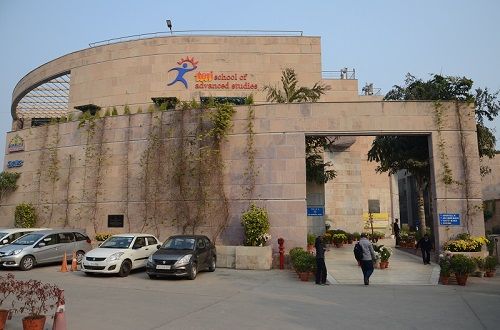The TERI School of Advanced Studies was established as a Trust in 1998 with the purpose of providing academic learning programmes. With TERI as its sponsoring society, TERI SAS focused its attention on developing a set of learning programmes that were both is support of, and were supported by, the research on issues of energy, environment and sustainability being undertaken by TERI. It was envisioned that the academic rigour brought by faculty members would enhance the quality of TERI’s application focused research, whereas the state-of-art research of TERI would constantly freshen up the curriculum of TERI SAS’s programmes and increase its societal relevance. This synergistic relationship would therefore further strengthen both the Institutes and increase their contribution to India and the world.
This relationship is enshrined in a memorandum of understanding between TERI SAS and TERI, wherein the two have agreed to share research infrastructure and undertake collaborative research programmes, joint studies and provide mutual support for seminars, symposia and conferences.
The purpose and vision for the University was further strengthened in 1999, when the University was granted “Deemed to be University” status by the University Grants Commission and notified vide the Ministry of Human Resources Development, Department of Education, Government of India, notification no. F.9-19/95-U-3 dated 5 October 1999.
Since its inception, the Deemed University offers not just world-class education, but also an environment that enables its students to develop fresh perspectives on their subjects of study. This includes regular interactions with researchers, scientists and academicians. The Deemed University’s first convocation was held on 16 October 2006, where 8 doctoral and 36 master’s degrees were awarded. Mr Nandan Nilekani, CEO and MD, Infosys Technologies, delivered the convocation address, stressing on sustainable development and incorporation of related concepts in higher education.
About the Program
The pressure on the non-human component of the ecosystem that we witness today can largely be attributed to the intensified pursuit of material consumption by a growing mass of population in the post-war period. Environment and Resource Economics attempts to recognize, understand, analyse, and evaluate the nature-society exchanges towards their implication on human well-being. Towards addressing this, it aims to design and implement effective policy instruments that assist in sustaining a given quality of life on earth and its enhancement over a longer time horizon. It involves rigorous grounding in standard economic theory and techniques and a simultaneous exposure to a wide variety of economic challenges due to the ecological / environmental / natural resource constraints.
The syllabus for the programme is frequently revised by bringing in updating the curriculum and introducing hands-on- practical session with the software packages like STATA and R as well as case studies and examples from policy making domains making domains. The quality of the curriculum is regularly evaluated by its stakeholders, peers, alumni and employers. The faculties are involved in active research with funded projects from SANDEE, DST, and several other funding agencies who regularly publish in the leading journals across the spectrum of economics. The programme also has a have received consistent appreciation from the students. Many of its alumnus have joined PhD programme in prestigious universities in India and abroad.
This programme has been offered by TERI SAS since 2009. The quality of students, their performance, cent percent placement and the expertise of the faculties make it one of the flagship programmes offered by the Department of Policy Studies as well as by the University.
Programme specific outcome
At the end of pursuing the MSc (Economics) with specialization in Environment and Resource Economics program the students are expected to:
- Gain in-depth knowledge of the concepts and theories of Economics with core aspects of ecological, environmental, and natural resource economics.
- Receive hands-on experience in applying economic concepts, theories, and methods towards analysis, appraisal and evaluation of a wide range of economic problems and policies.
- Develop analytical and writing skills through preparation of critical review, literature survey, research proposal and Masters’ Thesis.
- Develop and apply quantitative skills including numerical, statistical and econometric analysis using packages such as STATA and R.
Programme Structure
- MSc (Economics) with a specialization in Environment and Resource economics is unique as it not only includes advanced graduate level exposure to microeconomics, macroeconomics, mathematics, development economics, growth economics, statistics, and econometrics, but our students also receive an in-depth knowledge of the concepts, theories, techniques, policies and other applications in ecological, environmental, and natural resource economics. It offers a wide choice of specialized optional papers as well.
- The Master’s Thesis is mandatory, if not the most important component of the programme. It provides a hands-on opportunity to the students to apply economic concepts, theories, and methods towards analysis, appraisals, and evaluation of a wide range of environmental problems and policies so as to demonstrate their ability as research professionals. All students are supervised by one or more faculty members and every thesis is reviewed extensively by a panel of experts to ensure quality, originality and rigour. The quality of the dissertations has been appreciated in various forums including national and international conferences. Some of these dissertations have also resulted in publications in peer- reviewed journals.
Eligibility Criteria
- B.A. (Hons.) / B.Sc. (Hons.) in Economics with 50 % or more marks in aggregate. (CGPA of 5.65)
OR
- Bachelor degree in any other discipline with at least 60% marks in aggregate (CGPA of 6.75). The applicant must have studied mathematics either at 10+2 level or at Bachelor’s level, either as subsidiary or as honours.
Deadline
4 July, 2022
For more information Please Check the Link



